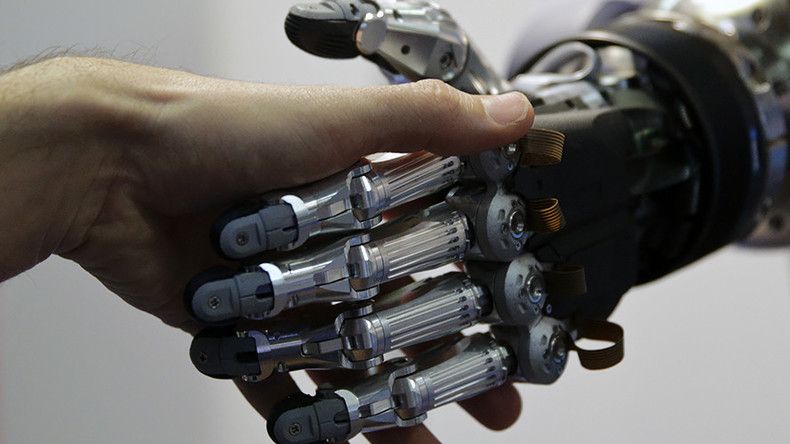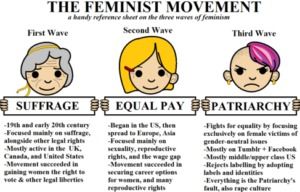“This work is based on our belief that VR offers new methods for storytelling and engagement.”
Read more
“This work is based on our belief that VR offers new methods for storytelling and engagement.”
Read more

“Psychologist says participants ‘seem to get deeper appreciation’ of their religious heritage in study conducted by scientists at Johns Hopkins University”

Great story in Politico Magazine on #transhumanism and a future AI President. My direct digital democracy ideas and others are mentioned: “Istvan, for one, envisions regular national elections, in which voters would decide on the robot’s priorities and how it should come out on moral issues like abortion; the voters would then have a chance in the next election to change those choices. The initial programming of the system would no doubt be controversial, and the programmers would probably need to be elected, too. All of this would require amending the Constitution, Istvan acknowledges.”
Yes, it sounds nuts. But some techno-optimists really believe a computer could make better decisions for the country—without the drama and shortsightedness we accept from our human leaders.

The prospect of attaining superior intelligence or physical attributes may be tempting or appear liberating, but cybernetic enhancement could, theoretically, also be used as a means of control. Whoever manufactures the technologies that augment humans would be in a very powerful position and wield an immense degree of control over their human customers (or subjects). Moreover, cybernetically enhanced humans could see their microchips hacked, have their sensations detected by unwanted parties and stored in a database, or be at risk of receiving unsolicited or unpleasant impulses. Might we evolve from homo sapiens to homo servus?
The dream that we may one day transcend our physical and intellectual barriers through advancements in cybernetics and nanotechnology could became a reality during this century. But would this be a blessing or a curse?
As science expands its frontiers and technology continues to evolve, ideas once deemed fanciful or considered part of science fiction find themselves within the realm of possibility. New discoveries may give rise to unique potential and perils, as the field of ethics struggles to keep pace with the latest technological advancements. The dream that one day we humans may eclipse our physical and mental fetters through augmentation by cybernetics or nanotechnology could become a reality. Although transhumanism and posthumanism are considered modern concepts, the idea of improving or transcending the human condition has been explored in philosophy and literature since at least the mid-19th century.
In his book Thus Spoke Zarathustra, 19th century German philosopher Friedrich Nietzsche introduced the concept of the Übermensch (overman or superman) as a goal towards which humans ought to strive, whereby they take control of their own destinies, work collectively towards the betterment of humanity and create a higher set of ideals to give their existence greater meaning. Nietzsche wrote “Man is something that shall be overcome.” (The notion of Übermensch was later corrupted by the Nazis, who integrated it into their perverse racial theories).

Artificial meat and food may be among our best tools to solve the problems of animal cruelty, feeding a growing population, and (in part) global warming. What do vegans and vegetarians think? In favour of cruelty-free lab-grown meat, or against it by principle?
I often say that I am not a fan of ‘-isms’. Not even those supporting the causes I care for, such as transhumanism. I sympathise with some ‘-isms’ (again, such as transhumanism), but I never consider myself a ‘something-ist’. The reason is that, generally, ‘-isms’ have two problems. The first problem is that they almost always support at least some ideas, or make certain claims, which I disagree with or find too fanciful (certain acceptations of ‘mind uploading’ come to mind, but that’s a story for another post). The second problem is that, if you say you’re a something-ist, people will almost surely assume that you endorse, or believe in, some ideas that are really not your thing, merely because such ideas are either an integral part of the relevant something-ism, or are what people think something-ism is about (which may or may not be true). Not to mention the fact that people often regard the dictionary as the ultimate authority on what ‘real’ something-ism is about, cheerfully ignoring all its variants and flavours (which often blur into mainstream something-ism and each other), whose proponents are usually well persuaded that their own something-ism is the real thing—others just got it wrong.
There’s actually a third problem too. Namely, that if they’re not careful, something-ists who are a bit too zealous might end up putting their ideology before the reasons they embraced it in the first place. Sometimes, this can undermine the very objective something-ists intended to achieve with their embracing the ideology and spreading it left and right.
I had a brilliant example of this phenomenon one time when, while having lunch at a vegetarian restaurant (or vegan, I’m not sure), I mentioned lab-grown meat to my friend. My friend is a vegetarian (or vegan, I’m again not sure), whereas I am not. Vegetarianism and veganism are, obviously, two ‘-isms’; as a corollary of the above, I’m neither a vegetarian, nor a vegan. (Although again according to the above, perhaps I should say ‘vegetarianist’…) I’m not just quibbling about definitions: I do indeed eat animal products of pretty much all kinds. This, however, doesn’t prevent me from sympathising with the cause of vegetarians and vegans who are such because they’re against animal cruelty. Quite frankly, even if animals are raised in the best possible way, and are then killed in the nicest possible way (whatever that means), eating them is still at odds with my own moral compass. Even though I do eat them.
[youtube_sc url=“https://youtu.be/wH7s-t70ggk”]
In April, Scientists based in Philadelphia unveiled an artificial womb undergoing testing on fetal lambs. With a prediction from one of the researchers that the technology could be ready for human testing in three to five years, artificial wombs suddenly became the most unexpected rage of 2017. But what sort of artificial wombs might realistically be a part of healthcare in the near future?
In this video series, the Galactic Public Archives takes bite-sized looks at a variety of terms, technologies, and ideas that are likely to be prominent in the future. Terms are regularly changing and being redefined with the passing of time. With constant breakthroughs and the development of new technology and other resources, we seek to define what these things are and how they will impact our future.
[youtube_sc url=“https://youtu.be/kHFVZV-lj8g”]
What is the ultimate goal of Artificial General Intelligence?
In this video series, the Galactic Public Archives takes bite-sized looks at a variety of terms, technologies, and ideas that are likely to be prominent in the future. Terms are regularly changing and being redefined with the passing of time. With constant breakthroughs and the development of new technology and other resources, we seek to define what these things are and how they will impact our future.


Lifeboat Editorial
Lydia Begag is a high school junior at Advanced Math and Science Academy in Massachusetts. She got our attention when she published an editorial critical of the school’s uniform policy. With eloquence and articulation, she laid out a brilliant and persuasive argument that the policy was anything but uniform. It was ambiguous, arbitrary and discriminatory.
I’m with Her
Ideas Regarding Sex Equality
—Forget the Rest
Political and social turmoil are everywhere we turn, especially in the early months of 2017. Lunch conversations, small talk at work, and, of course, the media we consume have all become related to a singular topic: the United States government and its workings. Emotionally, I want to curl up in a ball and block out the political nonsense being spewed left and right until the day I die (pun very much intended)—but I feel intellectually obliged to confront the controversy.
All who live and breath America understand why politics have always been a hot topic for debate. Every ideology, action, and word are potentially contentious. Such is especially the case with modern feminism. Everyone seems to have a different opinion of it and portrays it in different ways, from the group of men wolf whistling at a woman on her way to her car after work to powerful cultural figures who associate themselves with the movement. Before we can even begin to familiarize ourselves with conflicting beliefs towards women and feminism in general and their reflection of a worrisome mentality, it is crucial to first understand feminism’s roots in the United States, and how interpretations of the word and the movement have varied throughout the years.

Feminism begins its legacy in 19th-century America, where its first-wave arises at the Seneca Falls Convention of July 1948. Prominent feminists of the era (including Elizabeth Cady Stanton—more on her later!) issued a Declaration of Sentiments for women that emulated the Declaration of Independence their husbands had crafted 170 years earlier. The document asserted that women had fundamental rights that were denied without cause, including suffrage. However, the first-wave feminist movement raised a series of questions regarding whether it was acceptable to promote black civil rights over and into women’s rights. Should the rights of black men be prioritized over establishing and recognizing rights for women? Should black women be considered in the fight for gender equality as well, or would that undermine the cause white women had been fighting for for so long? The moral conflict eventually resulted in a success for the women’s suffrage movement in 1920. White women, led by famous feminists such as Stanton, Alice Paul, and Lucy Burns, gained the right to vote in federal and state elections via the 19th Amendment to the U.S. Constitution. Women of color, however, were left in the dust and did not start to gain suffrage until 1965. This type of exclusive feminism did not end when women of color gained suffrage; it has proven itself to be significant even today.
The list of American feminist milestones goes on and on. Women experienced sexual liberation in the Roaring 20s, when life was grander and more exquisite than ever. They essentially took over maintenance of the U.S. economy when men went to fight in the world wars, and Rosie the Riveter was born.  Women were also becoming increasingly influential in politics. Such milestones included the first woman to run for president on a major-party ticket in 1972 to landmark Supreme Court cases asserting that a right to privacy does include guaranteed legal accessibility to abortion and contraceptives. Title 9, the amendment to the Education Amendments Act of 1972, enabled girls in schools across the country to receive the same benefits as their male peers. All of these milestones reshaped a woman’s role in society throughout the 20th century onwards, but they did not come without drawbacks. The ’20s was an intense era of sexist and classist attitudes. Female sexual liberation resulted in extreme objectification. After WWI was over and soldiers came home, women were whisked back into the households to resume their roles as obedient housewives. Male dominance made running for public office harder for a woman, despite having the opportunity. And let us not forget the controversy surrounding a woman’s right to privacy. A significant factor involves religious morals and/or other ethical reasoning that are not related to gender equality, but it is impossible to ignore the misogynistic rationale that many pro-lifers exhibit. All of the achievements we’ve had have seemingly been countered by just as much dissent as support, a persistent reality since Abigail Adams urged her husband to support gender equality.
Women were also becoming increasingly influential in politics. Such milestones included the first woman to run for president on a major-party ticket in 1972 to landmark Supreme Court cases asserting that a right to privacy does include guaranteed legal accessibility to abortion and contraceptives. Title 9, the amendment to the Education Amendments Act of 1972, enabled girls in schools across the country to receive the same benefits as their male peers. All of these milestones reshaped a woman’s role in society throughout the 20th century onwards, but they did not come without drawbacks. The ’20s was an intense era of sexist and classist attitudes. Female sexual liberation resulted in extreme objectification. After WWI was over and soldiers came home, women were whisked back into the households to resume their roles as obedient housewives. Male dominance made running for public office harder for a woman, despite having the opportunity. And let us not forget the controversy surrounding a woman’s right to privacy. A significant factor involves religious morals and/or other ethical reasoning that are not related to gender equality, but it is impossible to ignore the misogynistic rationale that many pro-lifers exhibit. All of the achievements we’ve had have seemingly been countered by just as much dissent as support, a persistent reality since Abigail Adams urged her husband to support gender equality.
We are currently in the era of what fundamentalist feminists call “Take A Shot Every time You Offend Someone With One of Your Comments.” That term, of course, is colloquialism at its finest. You’re probably more familiar with something called third-wave feminism. This type of feminism has become increasingly less focused on the kind of feminism Stanton was prominent for (Yay! Exclusivity!) and more on queer and non-white women. The concept of intersectionality was introduced in the late ’80s just before this third wave began. It has received great support by women of color and those who had always been ignored by exclusive feminists, but as we already know, dissent is just around the corner.
The most popular criticism focuses on a lack of cohesion. First wave feminism fought for and gained female suffrage. The second wave fought for the right for women to have access to equal opportunity in the workforce and an end to legal sex discrimination. What is third  wave feminism’s goal? Is there even a goal, or are its advocates serving as the world’s determinators of what is PC and what is not? The stigma around the feminist movement has existed ever since its origins in this country, but the increasing disassociation of women from the term ‘feminism’ has become alarming in recent years. For every outspoken celebrity and political feminist there is out there (think Emma Watson, Shonda Rhimes, Nancy Pelosi) there is an equally prominent female figure that opposes the movement, such as Lana del Rey, Tomi Lahren, and Shailene Woodley. Here’s the kicker: these role models usually aren’t misogynistic or demeaning. They simply seek to avoid affiliation with the word itself and its modern day supporters. This is understandable; we’re a country founded on grounds of freedom. If a person doesn’t want to associate themselves with a movement, there’s no obligation to. However, the fact that women don’t even want to be labeled feminists because of what it has come to signify is something I find very problematic. I don’t see this as an inadequate reflection of what 21st century women believe in, but rather a poor reflection on the feminist crusade. The way I look at it is this: apples don’t fall off a tree because they are too heavy. Rather, they fall off because the stem is too weak to support them.
wave feminism’s goal? Is there even a goal, or are its advocates serving as the world’s determinators of what is PC and what is not? The stigma around the feminist movement has existed ever since its origins in this country, but the increasing disassociation of women from the term ‘feminism’ has become alarming in recent years. For every outspoken celebrity and political feminist there is out there (think Emma Watson, Shonda Rhimes, Nancy Pelosi) there is an equally prominent female figure that opposes the movement, such as Lana del Rey, Tomi Lahren, and Shailene Woodley. Here’s the kicker: these role models usually aren’t misogynistic or demeaning. They simply seek to avoid affiliation with the word itself and its modern day supporters. This is understandable; we’re a country founded on grounds of freedom. If a person doesn’t want to associate themselves with a movement, there’s no obligation to. However, the fact that women don’t even want to be labeled feminists because of what it has come to signify is something I find very problematic. I don’t see this as an inadequate reflection of what 21st century women believe in, but rather a poor reflection on the feminist crusade. The way I look at it is this: apples don’t fall off a tree because they are too heavy. Rather, they fall off because the stem is too weak to support them.
This creation of a conflict within a conflict has led to major confusion on what “right” feminism is. As defined by Merriam Webster, “feminism” is the theory of the political, economic, and social equality of the sexes. This most basic meaning of the word is something most women, if not all, should consider when they debate whether or not to label themselves a feminist. Sex equality is really the only thing the third-wave feminist movement should be focused on. Issues such as racial inequality, and rights for LGBT and disabled persons, are a matter for a cause much broader than feminism (think egalitarianism). The more narrow a movement and its fight becomes, the more likely it is to accomplish its goals. The first two waves of feminism all had a set goal in mind, which was something that followed core feminism to the nines. In the midst of all of the social unrest that has risen since the ’80s, the feminist movement has been trying to take over the egalitarianist one. However, if women ever wish to gain social equality between the sexes, it is necessary to narrow the cause to its fundamental roots.
Another issue with the modern feminist movement is that, in the effort towards sex equality, many feminists have interpreted being equal to men as trying to act just like them. Men and women are different, biologically and perhaps psychologically, but of equal value. To quote Mary Ramirez’s  “Dear Daughter: Here’s Why I Didn’t March For You”: “…we are biologically and physically and emotionally different from men, but that doesn’t mean we’re less. It means we’re special.”
“Dear Daughter: Here’s Why I Didn’t March For You”: “…we are biologically and physically and emotionally different from men, but that doesn’t mean we’re less. It means we’re special.”
Nonetheless, achieving social equality between the sexes is something I consider crucial, particularly for the girls just starting to grow up in this country. It is disheartening for women to live in a world where, from the moment we start to grow up and find ourselves in a male-centric society, life becomes a tale of denigration and overt sexualization. However, the problem with using modern feminism to change this sexist attitude is that it has turned into a male resentment club, and no longer seems to revolve around sex equality in society. Off the top of my head, I can think of multiple times where the “feminists” surrounding me on a daily basis have remarked on female superiority or denounced women who do not wholeheartedly accept their idea of feminism. Feminism should preach equality and acceptance. Instead, it has turned into a catty game of doing to the men what the men have done to us.  We live in a world where raising people up has turned into knocking others down. Vulgarity and impertinence has turned into the ideal image of a “strong” woman, and has become more and more acceptable. The idea of a feminist who respects others’ opinions has seemingly been swapped with one that thrives off of the idea of being regarded as “bitchy,” angry, or disrespectful. We’ve come a long way since our feminist founding mothers marched down Pennsylvania Avenue fighting for suffrage, and unfortunately, it’s not for the best.
We live in a world where raising people up has turned into knocking others down. Vulgarity and impertinence has turned into the ideal image of a “strong” woman, and has become more and more acceptable. The idea of a feminist who respects others’ opinions has seemingly been swapped with one that thrives off of the idea of being regarded as “bitchy,” angry, or disrespectful. We’ve come a long way since our feminist founding mothers marched down Pennsylvania Avenue fighting for suffrage, and unfortunately, it’s not for the best.
 Envisioning myself in the world of politics five or ten years down the road…I won’t pretend it doesn’t worry me at times.Influential female politicians over the years have found not their beliefs or their policy agendas as the primary subject of media conversation, but rather whether or not they’re menstruating or have considered cosmetic surgery. Seeing myself and others in my current situation has worried me as well. Despite growing up in a privileged setting where I receive nothing but acceptance from my family, the school and work environment has offered me and similar girls slut-shaming, catcalling, and the craftiest of off-hand remarks (“Who are you trying to impress today with that outfit?”). A multitude of women who come from different backgrounds have experienced similar toxicity in their surroundings. Ultimately, any setting for a woman can be a problematic one, and a promotion of classic feminism could turn things around. To me, an advocacy for respect on both sexes’ parts—rather than claimed superiority—would be transformative in making these conditions for bearable for young American women and men. Right now, what we have is extreme exclusivity and not enough acceptance.
Envisioning myself in the world of politics five or ten years down the road…I won’t pretend it doesn’t worry me at times.Influential female politicians over the years have found not their beliefs or their policy agendas as the primary subject of media conversation, but rather whether or not they’re menstruating or have considered cosmetic surgery. Seeing myself and others in my current situation has worried me as well. Despite growing up in a privileged setting where I receive nothing but acceptance from my family, the school and work environment has offered me and similar girls slut-shaming, catcalling, and the craftiest of off-hand remarks (“Who are you trying to impress today with that outfit?”). A multitude of women who come from different backgrounds have experienced similar toxicity in their surroundings. Ultimately, any setting for a woman can be a problematic one, and a promotion of classic feminism could turn things around. To me, an advocacy for respect on both sexes’ parts—rather than claimed superiority—would be transformative in making these conditions for bearable for young American women and men. Right now, what we have is extreme exclusivity and not enough acceptance.
Want to call yourself a feminist? Great! Reluctant to associate yourself with the movement but still support sex equality? Sounds good! Don’t support sex equality and a reversal of traditional gender roles? That is still okay! Obviously if an opinion undermines the cause you are fighting for, you’re not inclined to encourage it. But what the American public needs to realize is that, when advocates contradict the cause of unity and respect with their actions and words change will not come. Crudity does not empower you; it only cheapens you.
As mentioned before, narrowing down the movement’s goals is also crucial in moving forward. In comparison to many nations around the world, the United States has seen great success when it comes to fighting for sex equality. The third-wave feminist movement does have some valid issues to advocate for—domestic violence, raising awareness for rape victims, pay discrimination, etc.—but also chooses to focus on trivial causes like Free the Nipple and eliminating “manspreading.” Perhaps it is because we have obtained legal equality (thanks, first two waves!). But now that social equity has become the main focus, a blur of ideas and beliefs have resulted in a chaotic, incohesive movement. If you consider feminism at its core, the social issue to fight for is clear. There are many causes worth fighting for: racial inequality, ableism, and marriage justness, to name a few. But for the love of God, leave the aspects that do not relate to sex equality for the egalitarians. They’re there for a reason.
Author’s Note: This is my first article for Lifeboat Foundation.
Add comments below. I will drop in from time to time to respond.
— Lydia Begag
[youtube_sc url=“https://youtu.be/6tEiE_jix3c”]
A type of food that has been around for centuries, but is primed to be increasingly relevant to the future: Plant-Based “Meat.”
In this video series, the Galactic Public Archives takes bite-sized looks at a variety of terms, technologies, and ideas that are likely to be prominent in the future. Terms are regularly changing and being redefined with the passing of time. With constant breakthroughs and the development of new technology and other resources, we seek to define what these things are and how they will impact our future.
Follow us on social media:
Twitter / Facebook / Instagram